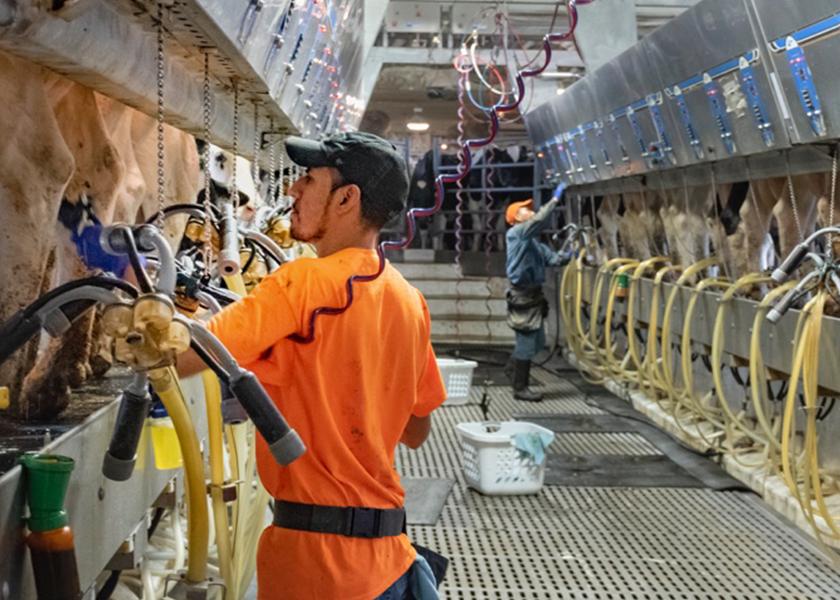More States Attempt to Manage Overtime Laws for Agricultural Employees

With rising minimum wage and other industries competing for labor, retaining good farm labor continues to be a top concern for producers. According to Stan Moore with Michigan State University Dairy Extension, labor costs are about 14% of a dairy’s total expenses. A recent USDA Ag Prices Report outlined that labor expenses were up 7.3.% compared to 2020 and is at a 20-year high.
California
The state of California begun phasing in overtime for agricultural workers in 2019. In 2022, the Golden State began requiring that any ag employees working more than 8 hours a day or more than 40 hours a week receive overtime compensation.
“Our minimum wage is $15, and we've got employees that are saying, ‘Hey, I've got to make more money,’” California dairy producer, Melvin Medeiros in Layton says.
The California dairyman says the quality of labor is tough and he doesn’t have a magic wand to fix it.
“I do know when legislation gets involved, it turns it into a mess. We're in that mess now and trying to figure it out and how do we invest in this farm to make it more efficient and cut back on labor,” he asks.
Washington
In Washington, dairy farmers were required to begin paying overtime for any of their employees who work more than a 40-hour week in 2021. Behind the District of Columbia, the state of Washington is the second highest minimum wage in the country at $15.74.
Fourth generation dairy farmer, Jason Sheehan, who runs J & K Dairy located 45 minutes outside of the Tri-Cities in eastern Wash., has been paying some form of overtime pay to his dairy employees for years, as he watched other states slowly introduce overtime practices.
The Sheehan's dairy employs 38 full-time workers, of which 80% have been there for three years and of those experienced staff, more than a third have 10 to 24 years with the dairy, Sheehan reports.
“Yes, we have people that have been with us for a long time,” Sheehan says. “If the pay was an issue with our employees, they would have gone and found work elsewhere.”
Sheehan employees average between 50-60 hours a week, as cutting hours is not something they have considered doing. Like most farmers who are also owner-operators, the Sheehan’s haven't reduced their own hours. Instead, they plow forward, even when they hit 40 hours by mid-week.
“We have to work until the job gets done,” he says. “That is the farmer's motto and really what we can focus on is continuing to do a good job of taking care of our cows, land and employees, and deal with the punches as they are thrown at us.”
New York
New York now ranks alongside California and Washington state in phasing in a 40-hour overtime threshold by 2032. The base will drop four hours per week every two years beginning in 2024. And New York dairy farmer Tyler Reynolds of Reyncrest Farms says managing his state’s overtime law is something he is forced to figure out.
“So far, we haven't really changed anything on [scheduling] because our guys really want 65 to 70 hours a week,” he says.
“I truly believe if I tie hours back, I'm going to lose some of my best guys because they'll most likely go to other states that allow for as many hours as they can get,” he says.
Reynolds shares that year-over-year labor costs on his farm have risen by 25-30%.
“I don't like to think of any of these guys as minimum wage employees,” he says. “Our minimum wage is $13.20, but we don't take anything off for housing. So, all of a sudden, these guys are $15 to $16 employees.”
Oregon
In 2022, it was signed that Oregon farmers now will be required to pay workers time and a half after 55 hours beginning in 2023 and incrementally dropping to 40 hours in 2027.
Oregon dairy farmer, Derrick Josi, better known for his TDF Honest Farming social media accounts, wasn’t surprised the overtime law was signed by his governor.
Josi, along with his family, milk 500 Jersey cows on the Tillamook, Ore. coast has 12 employees. He says that farmers will find a way to deal with the proposed overtime law.
“We always do,” he remarks.
“Dairy is standardized work,” Josi adds. “If we have to, we can adjust and hire someone else to keep our employees under 40 hours. Other farmers don’t have that luxury.”
Josi shares that currently he doesn’t have any problems with retaining employees, but states that “there is nobody out there to hire.”
Other states that pay overtime for agricultural employees includes Colorado, who started to phase in overtime at 40 hours in November, along with Hawaii and Minnesota, both who pay overtime after 48 hours.







